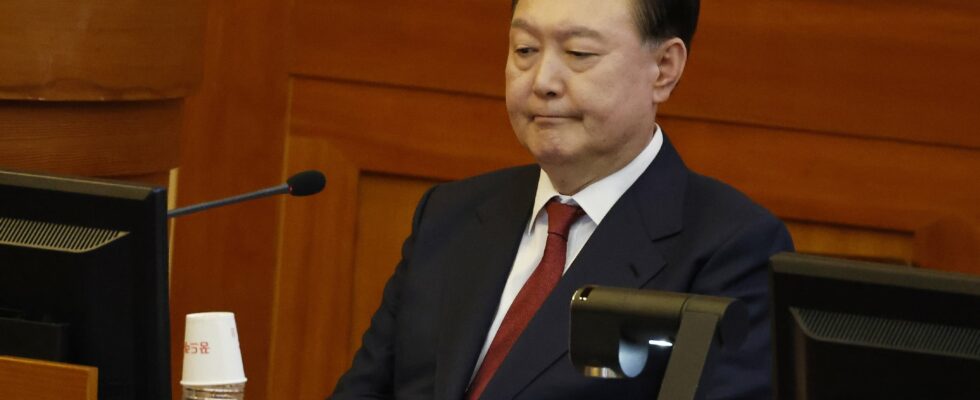South Korean President Yoon Suk-Yeol was charged this Sunday, January 26, for having taken the lead in a “insurrection” in his country, prosecutors responsible for the investigation in a statement said. They have matched their decision to maintain detention.
Yoon Suk-Yeol plunged South Korea into political chaos trying, on December 3, to decree martial law, a measure which only lasted six hours before being rejected by the deputies, who came to meet in emergency in parliament. He was suspended shortly after, before becoming, on January 15, the first South Korean head of state in practice to be arrested.
This arrest had intervened after a detention of several weeks in his residence, where his close guard had resisted attempts to incarcerate. Yoon Suk-Yeol is now at the Seoul detention center. He refused to cooperate in the criminal investigation into his declaration of the martial law, his lawyers arguing that investigators have no legal authority.
Its formal charges of detention means that it will now be maintained behind bars to its trial, which must take place within six months. This decision was widely expected after a court twice rejected the requests from prosecutors aimed at extending its arrest warrant for the duration of the investigation. “After an in-depth examination of the evidence obtained during the investigation, the prosecutors concluded that it was fully appropriate to charge the accused,” they added in their press release.
The need to keep Yoon Suk-Yeol behind bars was justified by a “continuous risk of destruction of evidence”, they said. The accusation of having led an insurrection is not covered by presidential immunity, they stressed.
“Erroned information”
The opposition praised this indictment. “We have to stop not only those who plotted to lead an illegal insurgency, but also those who fomented it by disseminating erroneous information,” said Han Min-Soo, member of the Parliament. Without providing evidence, the suspended president and his legal team invoked alleged electoral fraud and a legislative blockage within the parliament controlled by the opposition to justify the declaration of martial law.
Yoon Suk-Yeol promised to “fight to the end”, drawing the support of his supporters who adopted the rhetoric “Stop the Steal” (“stop on”), borrowed from the voters of Donald Trump, convinced That their leader was blurred in the American presidential election which he lost in 2020. “This indictment will bring a feeling of relief, reaffirming that the constitutional order works as it should be,” said Bae Kang-Hoon, Co -founder of the Valid political reflection group.
Yoon Suk-Yeol must also face a series of hearings in the Constitutional Court, which will decide whether or not to confirm his indictment and officially deprive him of the presidency. If the court decides against him, he will lose the presidency and an election will be organized within 60 days. He remains for the moment the South Korean head of state, despite his detention.
